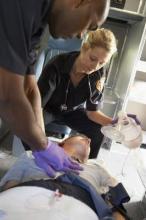In a pragmatically designed real-world trial, patients who sustained out-of-hospital cardiac arrest received no survival advantage when rescuers used a mechanical chest compression device rather than conventional CPR.
The Pre-Hospital Randomised Assessment of a Mechanical Compression Device in Cardiac Arrest (PARAMEDIC) study assessed how patients in cardiac arrest fared when given chest compressions by the LUCAS-2 device, compared with manual compressions. Dr. Gavin Perkins, clinical professor at the University of Warwick in Coventry, England, and his coinvestigators reported survival rates and neurologic outcomes for the two resuscitation methods in a 3-year study designed to assess real-life use of mechanical CPR (Lancet 2015;385:947-55).
Adult patients who sustained nontraumatic cardiac arrest within the service area of four large ambulance districts in the United Kingdom were randomized 1:2 to receive either mechanical or manual compressions – trial arm was decided by whether the ambulance arriving on scene carried the trial device, the LUCAS-2 mechanical chest compression system. Rescuers employed standard European Resuscitation Council guidelines and had advanced airway management, defibrillation, and drug administration capabilities.
PARAMEDIC’s primary outcome measure was 30-day survival, assessed by an intention-to-treat analysis. For the LUCAS-2 group, 104 of 1,652 patients (6%) achieved 30-day survival, compared with 193 of 2,819 (7%) in the manual compression group, a nonsignificant difference. Baseline characteristics and intensity of intervention were similar between the two groups. Further per-protocol statistical analyses confirmed nonsuperiority of LUCAS-2 for 30-day survival.
Overall, patients who received mechanical compressions had slightly worse neurologic outcomes, and a subgroup analysis found that survival rates were slightly lower for patients with an initially shockable rhythm – ventricular fibrillation or ventricular tachycardia – with use of the LUCAS-2.
The study’s robust real-world design aspects included the assignment method, which eliminated selection bias. Also, first responders received only the usual amount of training for new resuscitation technologies and were exposed to the typical one or two cardiac arrests per year. No CPR feedback technology was used for either the LUCAS-2 or for manual CPR. Because of the nature of the intervention, ambulance staff gathering initial data were not blinded; however, reported Dr. Perkins, dispatchers and those who assessed the primary outcome measure did not know which form of resuscitation had been delivered.
Noting that PARAMEDIC provides realistic information about outcomes using mechanical CPR, the authors said that “health-care systems will need to consider carefully the findings from this and previous studies when considering the role of mechanical CPR during out-of-hospital cardiac arrest.”
The study was funded by the U.K.’s National Institute for Health Research health technology assessment program; several authors also reported funding from this program during the study period. Dr. Perkins receives support as the director of research for the Intensive Care Foundation. No other conflicts of interest were reported.

